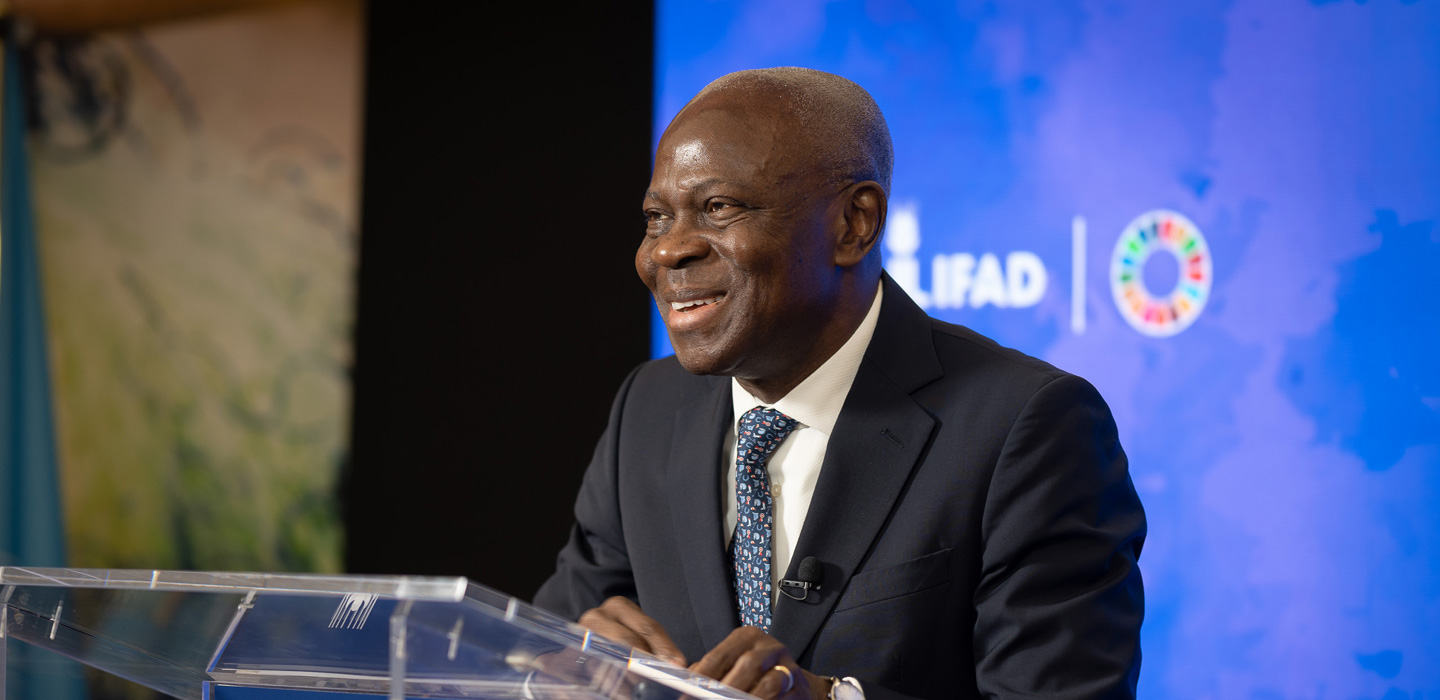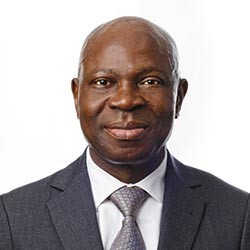Statement by Gilbert F. Houngbo, President of IFAD, Opening of the Forty-Fifth Session of the Governing Council
IFAD Asset Request Portlet
ناشر الأصول
بيان Gilbert F. Houngbo، رئيس الصندوق الدولي للتنمية الزراعية ، افتتاح الدورة الخامسة والأربعين لمجلس المحافظين
موقع: IFAD HQ, Rome, Italy
16 فبراير 2022
Monsieur le Président du Conseil des gouverneurs,
Excellences,
Mesdames et Messieurs les Gouverneurs,
Mesdames et Messieurs,
Je suis très heureux de vous accueillir à la quarante-cinquième session du Conseil des gouverneurs du FIDA.
J’avais espéré que nous pourrions nous réunir en personne cette année, mais la COVID-19 en a décidé autrement. La pandémie nous apprend à nous adapter et à innover sans cesse dans le contexte de l’action que nous menons pour concrétiser le Programme 2030.
Au cours de cette session du Conseil des gouverneurs, nous parlerons de climat, de financement et d’innovation. Ces éléments sont au cœur de notre programme de transformation rurale.
As you know, IFAD supports small scale producers in addressing interlinked challenges, with a focus on the most marginalized, including rural women, youth, and indigenous peoples.
An estimated 80 per cent of the world’s poorest and an equal portion of the hungriest live in the rural areas of developing countries. They are too often excluded from bigger development and financing initiatives. They are, and will always be, IFAD’s core constituency.
I am pleased to say that in 2021, 130 million of the world’s poorest people improved their income, food and nutrition security and their families’ livelihoods, thanks to IFAD-supported projects and programmes. This has been possible due to the hard work of our staff and our membership.
Despite huge challenges, we reached the target of $3.5 billion programme of loans and grants in 2021, which was the last year of the IFAD11 replenishment.
As the COVID crisis continued to severely impact lives and livelihoods, we also reached an estimated 4 million rural women and men with extraordinary support through IFAD’s Rural Poor Stimulus Facility. This facility, created in 2020 in direct response to the COVID crisis, has so far disbursed almost US$56 million in 60 countries.
The pandemic has rightly been the main focus of the global community. However, climate change is an ever-increasing threat to rural communities.
Small-scale producers are being hit hard by a crisis they did not create. And yet, only 1.7 per cent of climate finance reaches them. This must change.
IFAD has long been a strong partner for climate adaptation, and continues to lead in responding to this existential threat to small-scale farmers and rural communities. Most IFAD-supported projects already have an element of adaptation financing.
For example, in Bangladesh, we supported a flash flood early warning system; in Vietnam, a salinity monitoring system; in Mozambique, a stronger weather station network; and in Rwanda, stronger building codes for post-harvest processing and storage facilities.
For IFAD12, 40 per cent of the programme of loans and grants will be specifically climate focused.
In 2021, IFAD launched ASAP+ to provide grant-based climate finance, particularly to lower-income countries where climate change is affecting food security.
IFAD is also significantly scaling up partnerships with the three main climate funds – the Green Climate Fund, the Global Environment Facility and the Adaptation Fund.
On the IFAD12 replenishment, I am very pleased and humbled to have witnessed the strong commitment from you, our Member States to IFAD’s mandate through the highest ever level of contributions to a replenishment.
This was despite the pandemic and ongoing financing pressures so many governments were facing. We are deeply grateful.
The innovations and reforms we have embarked on together will allow IFAD to double its impact by 2030 while maintaining financial stability and sustainability.
The expansion of the mobilization and use of borrowed resources alongside core contributions is making it possible for IFAD to maintain a strong programme of work and offer support where it is needed across its membership, while at the same time ensuring that core resources are allocated to the poorest and debt distressed countries.
Among the most important reforms has been decentralization. Decentralization is making IFAD more impactful and responsive by bringing us closer to the governments we partner with and the people we serve. As we committed to do, by 2024, in the face of the current challenges we face, we expect to have 45 per cent of staff in the field, compared with 18 per cent in 2016.
In the global arena, IFAD’s financial and organizational reforms have been complemented by a concerted effort to share knowledge and to position IFAD as a thought leader.
IFAD succeeded in drawing global attention to the role and needs of small-scale producers at COP26 and the United Nation’s Food Systems Summit – putting poor rural people at the centre of food systems transformation. IFAD is committed to ensuring that the momentum created at the Food System Summit delivers concrete results and we will work to support national pathways through UN country teams.
The pandemic and climate change have starkly exposed the vulnerability of small-scale producers and the inequity that the people who produce a third of the world’s food receive only about 6 cents for every $1 of product they generate. There is no sustainability or resilience without greater equity.
IFAD’s work is essential for these communities. I firmly believe that there continues to be a critical need for IFAD’s specialized role as the world’s leading Fund with an exclusive focus on rural development. Without IFAD, millions of rural people would not have a strong and dedicated partner to help them improve their lives and livelihoods.
IFAD has a noble and essential mission. I can assure you that staff and management alike are determined to carry on until we have created a more equitable and just world.
